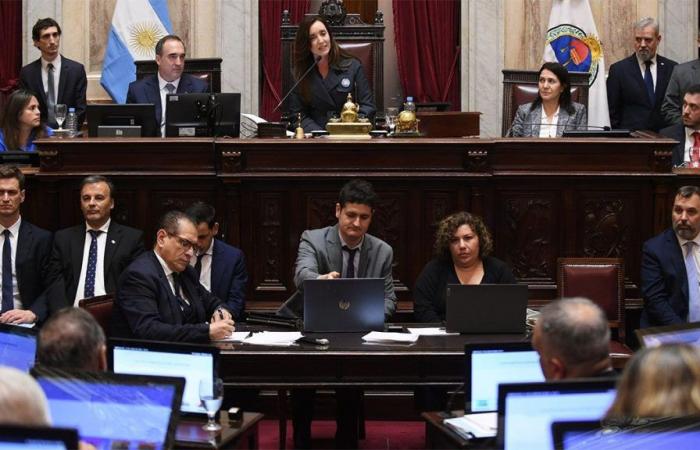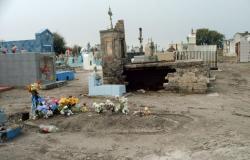►YOU MAY BE INTERESTED: The Mendoza ruling party calculated that, with the rejection of Ganancias, the province loses more than $75,000 million
base law villarruel.jpg
Vice President Victoria Villarruel had to break the tie for the vote on the Bases Law in general.
“We have to recalculate the profit issue,” he said. in accordance with the position of the Ministry of Finance of Mendoza. “With this, the Government was thinking of lowering the COUNTRY Tax, and now it will not be able to. It would be important for the stability of Argentina,” he determined.
In any case, despite this rejection that the ruling party can still reverse in Deputies, “overall it’s good news. Otherwise, today the markets would have been very complicated,” he added.
“It is the right path but a profound labor reform is needed”
“It is the right path but a profound labor reform is needed.” It is the opinion of economist from the National University of Cuyo (UNCuyo) Adrián Acevedo. The professional pointed out about the RIGI that “it is important that companies have incentives to invest; but I think more changes are needed for these investments to arrive. What is needed is a profound labor reform“.
Acevedo considered that this “Milei’s triumph” will be seen in the markets: “The Argentine stock market will rise and the dollar will fall. The main thing is that the national government obtained a law after six months and that to achieve it it had to negotiate, it had to do politics. That’s positive.”
►YOU MAY BE INTERESTED: The dollar fell sharply in Mendoza after the approval of the Bases Law in the Senate of the Nation
Regarding the rejection of the changes in Profits, (which prevented the restoration of the fourth category of the tax so that some 800,000 workers could pay it again), the economist explained: “The Government of Mendoza expects changes because it would be important for collection; but not so for people’s pockets. What is positive for the Province is that the increase in the non-taxable minimum for Personal Assets has been rejected because it is co-participable and that implies that more people will be covered by the tax.
Is recovery coming? “It is positive to at least have this law, to lower the dollar, to have an incentive regime. But For investments to actually arrive, it is necessary for labor costs to drop.“he insisted.
“Today you do not have a sector that is recovering. There is a loss of state jobs; as long as construction is expensive due to inflation there will be no employment in that sector either and commerce is affected because people do not buy. For everything to move, a reactivation. And I don’t think there will be a quick recovery. Everything indicates that it will be in a U,” Acevedo analyzed.
The Peronist criticism
Nicolás Aroma, the economist advisor to Peronism in Mendoza, largely coincided with the presentation made by national senator Anabel Fernández Sagasti during the debate on the Bases Law. “The approval of the Base Law and the fiscal package is bad news for Mendoza,” she said.
Although within this, he highlighted: “It is good news that the Profit reform has not been approved”.
senate law bases anabel.jpg
What he considered is that the proposed set of tax rules “was absurdly regressive with the changes in Profits, the increase in the Monotax and the increase in the non-taxable minimum of Personal Assets. All concatenated to encourage money laundering.”
Money laundering was approved, although with five major changes compared to the project that came from the Deputies. In the Senate it was established that cryptocurrencies cannot be laundered abroad; Properties in the name of companies can only be laundered if they were declared by the company; the prohibition of officials from adhering to money laundering increased from 5 to 10 years; Brothers of officials and all first and second degree relatives were included in the ban.
And tools were included for the provinces and productive investments, as a possible tax-free destination of the funds that will be deposited in special accounts.
For Aroma, “laundering leaves nothing in the country, because you can launder 100,000 dollars and pay 0 pesos (in taxes); and even exceeding that figure, you can also avoid payment if you deposit them in a special account. Not to mention that with front men you can also avoid payment.
Unlike his colleagues, The Maipucino economist questions the RIGI: “It is detrimental to the productive and economic environment, especially to the metalworking sector. This is even despite the local purchase that was introduced because the change is minimal; 20% is very low. These are good intentions but in practice it is dead letter”.
And he described it as “anti-national industry.” And he expanded: “We are facing a strong recession and SMEs are going to fall by the wayside. The adjustment variable is employment. And at the same time, it is false that wages will rise because when the unemployment rate rises, wages compete downwards.”






